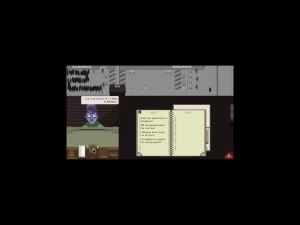At this point, I shouldn’t be surprised by the variety of games that come from the indie community and today’s game: Papers Please is something that wouldn’t have been possible elsewhere — Using very simple graphics and gameplay to create an experience unlike no other.
Working 9 To 5:
Papers Please takes place in the fictional communist country of Arstotzka during the 1980s. The border has finally been opened and you have been selected to spend the next month as an immigration inspector. Your job is to check the papers of every immigrant into the city and decide who can come in and who will be turned away… or worse.
From your booth you have access to the tools of the job — a pass and fail stamp and most importantly the rule book. Inside the rule book, you’ll find the names of the neighboring countries and their major cities, along with the rules that you must abide by when deciding who can come in or not.
Every day, you’ll deal with the long line of people awaiting access into the city. Some of which have fake IDs or not enough credentials to pass inspection. For every person you judge correctly, will add to your daily pay. Fail enough times in a single day and you’ll start to be docked for every incorrect assessment.
To add more weight to the situation, you have your family waiting in your apartment that need food and heat everyday to survive. And unless you do your job perfectly, you may have to decide whether it’s important for everyone to eat or not freeze for that day.
As each day of in game time passes, the rules for the border changes and you’ll soon find different IDs to examine, interrogations to perform and even the choice of accepting bribes or not. The game does an exceptional job of putting your morality to the test as you’re constantly juggling the needs of the state, the lives of the people and of course your family.
And despite the simple graphics, a story begins to emerge in Papers Please as terrorist attacks begin to threaten the city state and without spoiling anything, you’ll have to decide where your allegiance will fall.

Part of the strength of the game is how the simple graphics hide the darker tones and morality choices that are going on.
What’s so great about Papers Please is that the game tells this big story along with morality, while using nothing but simple 8 bit graphics and basic game screens.
For example, your family is represented by icons on the results screen. It really lets the player fill in the rest with their imagination as to what their decisions are affecting.
Papers Please is one of those games where everything about it was designed explicitly by the developer, which makes it hard for me to criticize, except for two points.
First was that I had a problem with the resolution of the game screen. Either the game window showed the entire screen but zoomed out to the point that it was hard to read details. Or it was zoomed in, but a quarter of the screen was cut off in the process. I don’t know if this was a bug or if I didn’t set the screen settings right, but it was annoying.
Second, the only real gameplay mechanic that I had a problem with was the upgrade system. You can spend money on upgrading your booth, which basically unlocks quality of life upgrades like bookmarks in the rule book or a hotkey for selecting your stamps.
I’m not a big fan of games that restrict or lock basic features as a way to add depth later on. I would have preferred more gameplay related upgrades like a way to be able to spot fraudulent IDs easier or give you more time each day and so on.
Papers Please may not be the best looking or most complex title released this year, but it shows that sometimes less is more. A unique game that’s all about you and the choices you make when your morality is pulled in different directions to become shades of grey instead of black and white.


